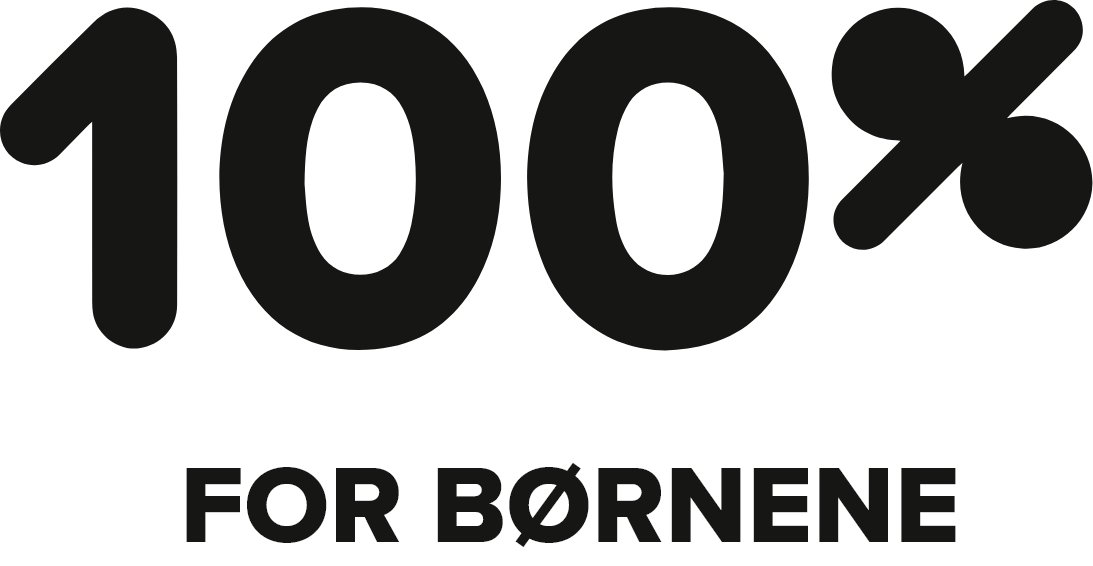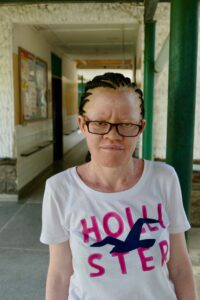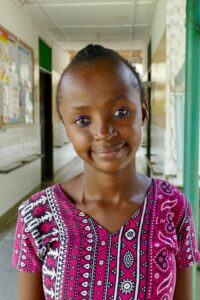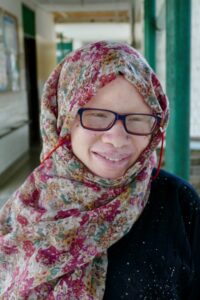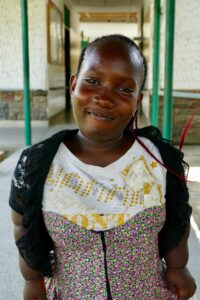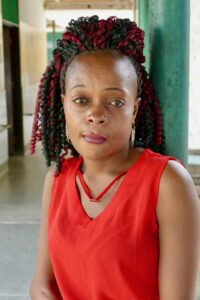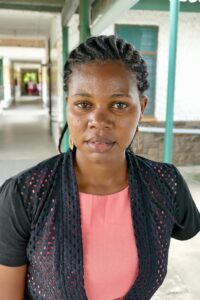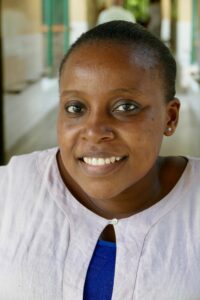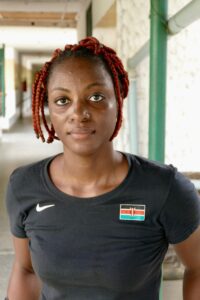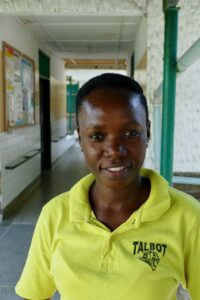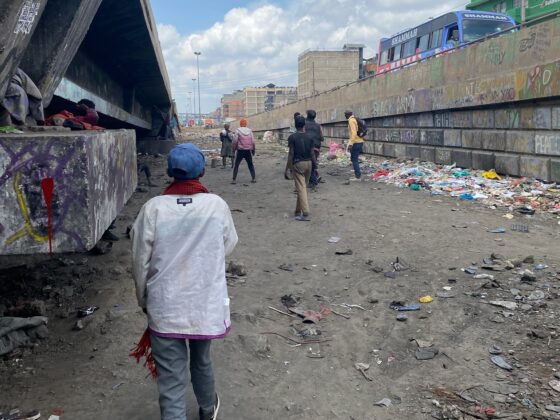Nothing for us without us
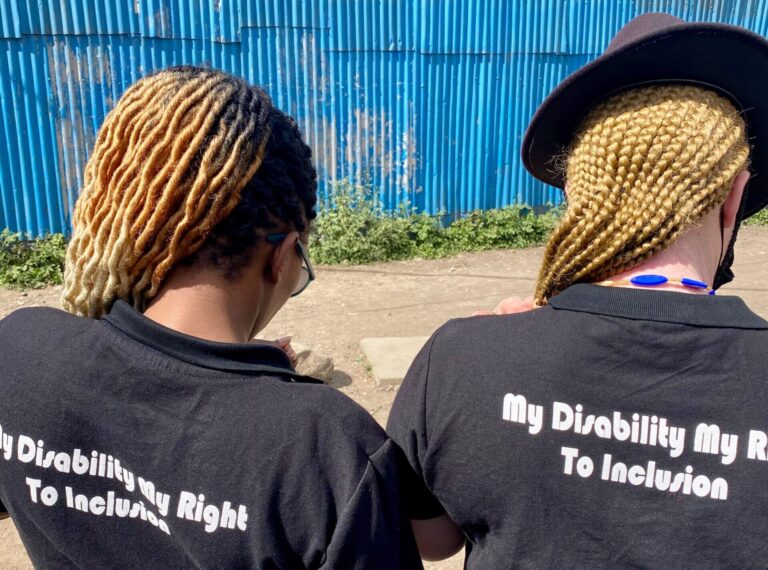
A slightly clumsy title. We know. It often works better in English, and that's precisely the case with the project "Nothing for us without us." Nevertheless, we would like to tell you about it. And about our ambassador method. But most importantly, we want to tell you Delvin's and Vanessa's story.
The story behind our ambassador method for young people with disabilities:
It all started in 2019 when, in collaboration with the Association for the Physically Disabled of Kenya (APDK), we embarked on testing a new method – allowing young people to speak for themselves to create tangible changes in their local communities. Young female ambassadors were trained in advocacy to raise awareness about the exclusion and stigmatization of girls with disabilities in schools and communities in Mombasa. The project taught us that empowering these young women to speak for themselves led to reduced self-stigmatization, strengthened community bonds, and better understanding of the girls' disabilities within their communities. The bond among the 10 ambassadors and their determination to create lasting change led them to continue as an informal civil society organization even after the project ended. This marked the beginning of a new journey between 100% for the Children and APDK.
A monitoring trip that changed everything
When Charlotte Lea Jensen, employed by 100% for the Children, traveled to Mombasa to evaluate the project in collaboration with APDK, she had the opportunity to meet with the 10 female ambassadors. Their stories made a tremendous impact—from the conditions they have lived under to the ongoing discrimination they experience in society. Charlotte was not alone in hearing their stories and learning about the sense of community among the ambassadors. Also present at the meeting was Benson Kiptum, program manager at APDK. While he typically works at the headquarters in Nairobi, he was curious about what the young ambassadors had to share.
Benson returned to Nairobi deeply inspired by the 10 young women. Together, 100% for the Children and APDK decided to pilot the method in Nairobi. This led to a new project focused on creating a more inclusive job market for individuals, especially young people, with disabilities. Ten young female ambassadors were trained in advocacy work and disability rights, mirroring the approach taken with the Mombasa ambassadors. These ambassadors successfully gained access to both public and private workplaces, where they engaged with company leaders and emphasized the need for an inclusive job market. Remarkably, they even gained entry to offices that APDK itself had struggled to access. This success underscored the effectiveness of the ambassador method: policymakers take notice when they hear personal stories about living with disabilities alongside concrete demands for fulfilling their responsibilities for inclusion.
A choice is on the horizon
In 2022, Kenya faced elections to decide the country's next president. Previous presidential elections in Kenya have been far from inclusive for people with disabilities. This includes challenges such as voter registration, physical access to polling stations and ballots, and the ability to participate as a politician with a disability. People with disabilities have been denied access and discriminated against due to their disabilities, thus being unable to express their voice through voting. Once again, 100% for the Children and APDK decided to mobilize their ambassadors to address these issues.
This time, the ambitions were high. The ambassadors were tasked with helping more people with disabilities register as voters. They were to serve as observers during the election to ensure a peaceful atmosphere and the inclusion of people with disabilities. After the election, they were also responsible for holding the elected officials accountable for the promises made regarding disability issues.
How did it go?
No less than 4.6 million people with disabilities were registered as voters in the lead-up to the 2022 election. This number exceeds the government's estimate of the total population living with disabilities in Kenya. The ambassadors, in collaboration with APDK, worked diligently to raise awareness about the electoral process. They also assisted in distributing information materials tailored to different types of disabilities.
For the first time in a long while, the election in Kenya was peaceful. It took place without violence, deaths, or unrest—a rarity compared to the recent elections in the country. Ambassadors were present at polling stations in both Nairobi and Mombasa to promote a peaceful and inclusive election.
Holding politicians accountable for their promises is a long-term process. In collaboration with APDK, a local expert, and a coalition of disability organizations in Kenya, the ambassadors have developed a monitoring tool. This tool allows them to systematically monitor specific promises and developments in selected areas.
The ambassadors' own thoughts
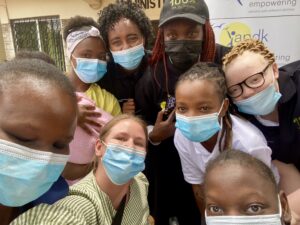
Delvin is one of the young female ambassadors who has been instrumental in advocating for a more inclusive job market and elections in Nairobi. Delvin herself shares that she is incredibly proud to speak on behalf of those who often do not have a voice: young girls with disabilities. Delvin was among the ambassadors who visited numerous companies to discuss what they miss out on by not hiring people with disabilities. She has highlighted the valuable qualities that people with disabilities possess and the barriers they repeatedly face when trying to be fully integrated into society. She is a skilled advocate and also succeeded in securing employment herself after impressing one of the companies during a meeting. Delvin has also been involved in the election project, where she has fought for more people to have the opportunity to vote under inclusive and peaceful circumstances.
Another ambassador is Vanessa, who started her ambassador role in 2020. Before becoming an ambassador, Vanessa attended a special school for children with disabilities. She was shocked when she graduated and encountered what she calls 'the real world'. Here, there were no accommodations, plenty of prejudices, and very little understanding. Vanessa shares that her ambassador role has strengthened her and provided practical preparation for navigating the 'real world'. She has learned about rights, advocacy, employment, and democratic processes—all of which she applies in her daily life. In addition to the specific knowledge she has gained, it is clear to see how her confidence has grown.
Initially, you could barely hear what Vanessa was saying when she spoke. Now, she is the spokesperson for the ambassador group, and there's no doubt when Vanessa has something on her mind. Vanessa's own experience with the 2022 election didn't start well. She couldn't access the registration site, and her mother had to carry her all the way. Instead of giving up, Vanessa took action. She highlighted the challenges she faced. Despite encountering an initially unfriendly staff member, Vanessa persisted. Eventually, she succeeded in getting the staff to understand. Vanessa's only wish for the election project is that the ambassadors had more time. She believes they could have accomplished twice as much, saying this with a smile.
Both Delvin and Vanessa are clear, human examples of why the ambassador method works. Who could better speak about life with disabilities and the challenges, opportunities, and untapped potentials that exist? That's why 100% for the Children and APDK listen. And that's why politicians, business owners, and other decision-makers listen. Together, they are going to change the world for children and young people with disabilities.
